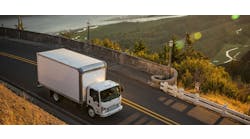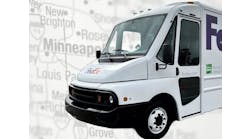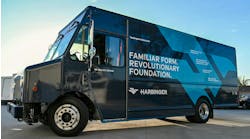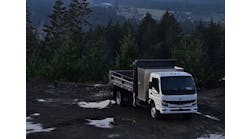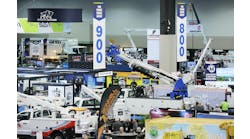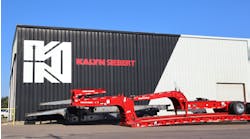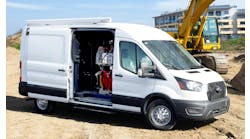Volvo Trucks became the first manufacturer to announce plans to commercialize dimethyl ether (DME)-powered heavy-duty commercial vehicles in North America—the latest step in its “Blue Power” alternative fuel strategy.
DME mirrors the exceptional performance qualities and energy efficiency of diesel, and burns clean without producing any soot. It can be made from a variety of sustainable domestic sources, as well as from North America’s abundant supply of natural gas, and therefore has the potential to significantly reduce energy dependency.
Converting natural gas to DME is an innovative way to address many of the distribution, storage, and fueling challenges otherwise presented by natural gas as a heavy truck fuel. Volvo announced plans to begin limited production in 2015 of DME-powered vehicles.
Göran Nyberg, president of Volvo Trucks North American sales and marketing, was joined at the California state capitol by Cliff Rechtschaffen, Gov Jerry Brown’s senior energy advisor, and by executives from Oberon Fuels, the first company to announce plans to commercialize DME fuel production in North America.
Volvo’s DME technology will be available in a Volvo D13 engine, and the company’s I-Shift automated manual transmission will be standard on DME-powered trucks. DME-powered vehicles will join a line-up that already includes CNG-powered Volvo VNM and VNL model daycabs. The company will also introduce its own proprietary LNG engine in VNL daycabs and sleepers in 2014.
Volvo decided to invest in DME technology and introduce it to the North American market because of the benefits DME offers as a heavy-truck fuel. Its high cetane number delivers performance and efficiency comparable to diesel, and it packages densely enough on a truck to support long-range transports, or to allow room for vocational equipment on the frame. It is an excellent compression ignition fuel which, like diesel, requires no separate ignition mechanism. Unlike LNG, it does not require cryogenic temperatures; it is handled and stored like propane, with tank pressures of only 75 psi (vs 3,600 psi for CNG). It can safely be stored on-site.
Because DME produces no soot, no diesel particulate filter (DPF) is necessary. In addition to weight savings from the removal of DPF, DME tanks are considerably lighter than comparable CNG or LNG tanks and considerably less complex.
DME is non-toxic, and is already used as an aerosol propellant in cosmetics and other household products. It can be made from a variety of sustainable feedstocks, including biogas from food and animal waste, wastewater treatment facilities, and landfills. When produced from biomass or biogas, DME can provide up to a 95 percent CO2 reduction compared to diesel.
Oberon Fuels has developed new skid-mounted, small-scale production units that can cost-effectively convert biogas and natural gas into DME. The first of Oberon’s production units will go online in June in California’s Imperial Valley region. ♦

